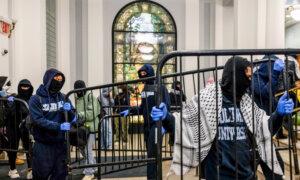The former president’s remarks come as students barricade themselves in Columbia University’s Hamilton Hall. The White House says they are ‘not peaceful.’
As Columbia University plans to suspend certain pro-Palestinian protesters after rejecting demands for the school to disclose and divest from Israel, former President Donald Trump asked if those who hijacked Hamilton Hall will face similar consequences to Jan. 6 defendants.
Pro-Palestinian protests have erupted at universities across the country over the past month, including the University of Southern California, the University of Texas at Austin, Virginia Tech, the University of North Carolina, and others.
Police have arrested nearly 1,000 students and faculty, and some lawmakers and students are pushing back against demonstrations they fear are growing increasingly anti-Semitic and threatening campus safety.
President Trump spoke with reporters on April 30 while standing outside the Manhattan courtroom where he is facing a criminal trial over his alleged 2016 hush money “scheme.”
“This whole country is up in arms, breaking into colleges, knocking the hell out of Columbia University,” President Trump said, adding that it is a “big deal” that protesters took over a whole building—Hamilton Hall—on the New York City campus.
“And I wonder if what’s going to happen to them will be anything comparable to what happened to [Jan. 6], because they’re doing a lot of destruction, a lot of damages, a lot of people getting hurt very badly.”
The former president questioned whether the Hamilton Hall protesters would receive the “same kind of treatment” as those involved in Jan. 6.
“Let’s see how that all works out. I think I can give you the answer right now. And that’s why people have lost faith in our court system,” President Trump said, seemingly suggesting the students would be treated differently for their actions.
The former president has criticized President Joe Biden over the pro-Palestinian protesters on American college campuses in recent weeks, blaming his administration’s handling of the Israel-Hamas war as the nexus for the student backlash.
President Biden also faced opposition from Muslim Americans in Michigan, who initiated a campaign to vote “uncommitted” in the state’s Democrat primary in February.
With many pro-Palestinian students also expressing their disdain for the president, some experts wonder how it will all affect his reelection chances in November.
The demonstrations are applying pressure as the Biden administration negotiates a cease-fire, pushing Hamas to release its hostages and Israel to reduce Palestinian casualties.
With the August Democratic National Convention on the horizon, the campus protests risk repeating the violent unrest seen outside the one that was held in Chicago in 1968, when Vietnam War protesters clashed with police.
Those scenes, according to some Democrats, contributed to former President Richard Nixon’s victory.
“If it ends with Columbia, that’s one thing,” said historian Angus Johnston, who focuses on campus activism. “If this sends the national student movement to a new place, that’s a very different situation.”
Protesters seized and barricaded Columbia University’s Hamilton Hall on April 30 while yelling pro-Palestinian chants and slogans.
In response, university officials closed the campus to all but essential employees and on-campus students.
The White House on April 30 denounced the protests, labeling them “not peaceful“ and the “wrong approach.”
“The president believes that forcibly taking over a building on campus is absolutely the wrong approach. That is not an example of peaceful protests,” national security adviser John Kirby told reporters during a call.
President Trump had previously said the 2017 Charlottesville “Unite the Right” rally was a “peanut” compared to the pro-Palestinian student protests.
However, his April 30 remarks are the first time he has compared the protests to Jan. 6, when a group of his supporters breached the Capitol to delay certification of the 2020 election results, leading to vandalism, violence, arrests, and years of ongoing court cases.
The number of Jan. 6 arrests has climbed into the hundreds, with President Trump facing criminal charges over the riots in Justice Department Special Counsel Jack Smith’s case in Washington.
President Trump has vowed to pardon the Jan. 6 defendants if he wins the election, saying it would be among his first duties as president, along with closing the border and drilling for oil.
Independent candidate Robert F. Kennedy Jr. severed ties with a marketing contractor in April who sent out an email for the campaign calling the rioters “Jan. 6 activists.”
However, Mr. Kennedy clarified in a statement that he is “concerned about the possibility that political objectives motivated the vigor of the prosecution of the [Jan. 6] defendants” and wants to “hear every side” regarding the contentious issue.
When asked in March if he would pardon the Jan. 6 defendants, Mr. Kennedy said he would not comment on that until after winning the general election in November.
He said, however, that pardons for American intelligence contractor Edward Snowden and WikiLeaks founder Julian Assange would come if he became president.
Emel Akan and The Associated Press contributed to this report.
Original News Source Link – Epoch Times
Running For Office? Conservative Campaign Consulting – Election Day Strategies!


